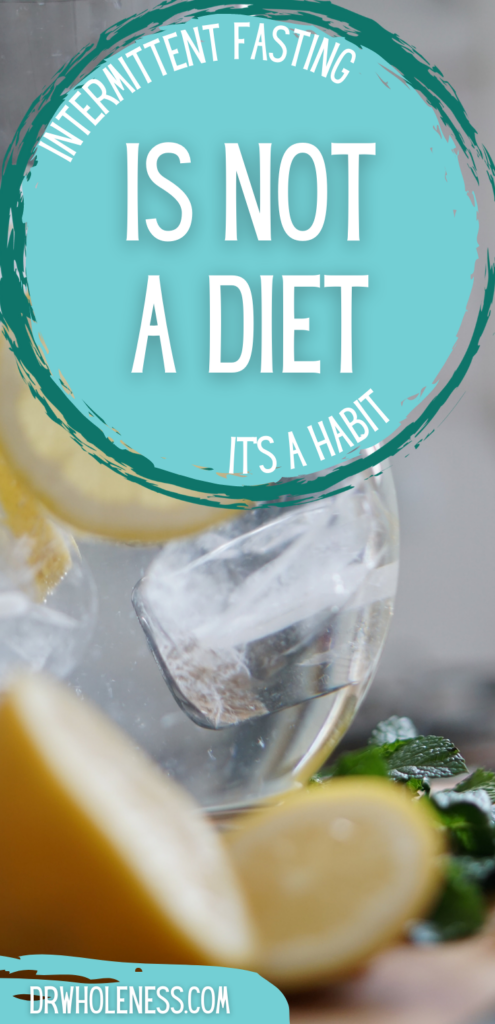For starters, intermittent fasting is not a diet. It is an experiment on yourself. If you view it as an experiment rather than a diet you will enjoy the freedom it offers as opposed to feeling shackled by eating within certain windows of time.
Intermittent fasting shouldn’t make you feel anxious, depressed, irritable, cause you to have a lack of energy or eliminate your menstrual cycle.
Intermittent fasting should make your life simpler, and your body and mind more effective.
Intermittent fasting is not a diet, or a low calorie plan, it is a lowered time frame for eating food strategy.
So many clients when they start out with intermittent fasting decide to decrease their food intake as well. They end up malnourished and binge eating and essentially worse off than they were previously.
If you are practicing the standard 8 hour feasting and 16 hours fasting windows and not feeling well then it is time to readjust your fasting and feeding windows.
We all have different body compositions, different life routines, different responsibilities and physiological needs, so keep working it until you find the windows of feeding and fasting that work best for you both in how you feel and the desired results you want to attain.
The thing I have found with intermittent fasting is that it can help people just as quickly as it can harm people.
One patient who is under great stress may find intermittent fasting to be liberating and a stress reducer the next patient finds intermittent fasting to seemingly drain them of all capacity for life.
Who should intermittent fast?
Generally men find it significantly easier to consistently intermittent fast than women.
I have seen many women lose their periods while fasting for 16-18 hours most days and then regain it with no other dietary changes when they brought their fasting window back down to 13 hours.
I have also found that many times these women are simply not eating enough food because of life circumstances or work during their feeding window. This is not optimal. Remember intermittent fasting is not a diet!
We want estrogen, progesterone, cortisol, testosterone working on our behalf to maximize the effects of intermittent fasting and if you have lost your period you are not maximizing its effects, you are actually creating unneeded strain on your hormonal system.
And the very thing you are trying to promote such as improved body composition and slowed aging is not being promoted, so you want to get in a rhythm that will permit you to have a fasting window but not lose your period.
Can you fast and be an endurance athlete? Can you fast and gain strength and muscle mass?
For sure. However, you will just have to be extra considerate of getting sufficient food when you are in your feeding window.
Should children or pregnant women intermittent fast?
I would not recommend it. If children are given whole foods their bodies are great at telling them when they need more food, and they should listen to those natural cues.
For standard industrialized world adults who have an abundance of food always present, we have lost many of our natural hunger cues and tend to eat out of routine, habit or boredom, so creating window for eating and fasting can be very valuable.
How to fast with ease
Intermittent fasting will be easier if you consume real whole foods during the feeding window, as opposed to insulin and blood sugar spiking foods.
Eating a bunch of processed food during your feeding window is going to make the discipline of maintaining a fasted lifestyle overwhelming and you are going to be one irritable human.
A study from the University of Alabama revealed that participants eating between 7am and 3pm as opposed to between 7am and 7pm, had significantly lower insulin, blood pressure and appetite as well as improved insulin sensitivity.
If you are looking for those benefits, check out the eating window you currently consume food within. Subtract one hour in the morning or evening from that window. See how that feels over a couple of weeks. If it feels good or no major life disruption, then try shaving another hour until you get to a time frame where you feel fantastic and can maintain that time frame.
You can also do alternate day fasting. Fast on the weekends or fast just on days you work. I have nurses who to keep things simple, fast on the day they work plus it helps keep them out of the vending machines.
Intermittent fasting is a tool you can use to increase your body’s efficiency across the board. If you are getting stressed and anxious about it, then the fasting becomes self defeating. To read about all of the amazing benefits of Intermittent Fasting check out this post.
What’s your time frame for intermittent fasting? I’d love to hear about it in the comments below.

